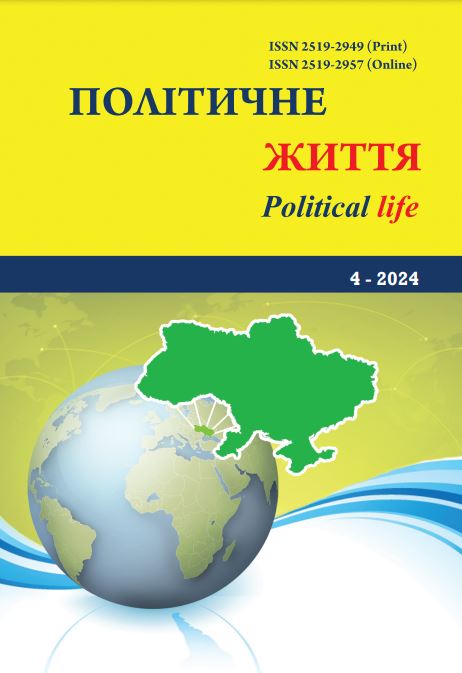Peculiarities of ways of solving international political conflicts on the example of Greece and Turkey
DOI:
https://doi.org/10.31558/2519-2949.2024.4.16Keywords:
political conflict, wars, national identity, information policy, democracy, conflict resolution methods, collective sense of ownership, Greek-Turkish relations, propaganda, international conflict, international relations, ethnic tension, violence, populism, inter-ethnic enmity, ethno-political conflict, de-escalation of the crisisAbstract
The article analyzes the features of ways to resolve international conflicts using the example of Greece and Turkey. In accordance with the defined object, subject of research and tasks, a methodology is introduced that involves the use of several methods and approaches. The following methods are used: the historical method made it possible to investigate the genesis of the conflict and identify the main points in its development. The sociological method made it possible to clarify the influence of international organizations on the resolution of the political Greek-Turkish conflict. The functional method was used to analyze the relationship between the political components of the conflict. The behavioral method was used to study the diverse behavior in the policy strategy in resolving the conflict of political leaders and interest groups. The systemic method made it possible to consider the conflict as a holistic political and social phenomenon. It is substantiated that the clash of interests between two countries can be rethought in order to take into account the causes of failures. It is proved that it is necessary to solve problems as a prerequisite for better relations. It is determined that there is no direct hostility or conflict between the two nations, instead identities were formed and constructed in accordance with the preferences of the regime. Thus, political culture and the idea of states as they are understood are fixed in terms of norms, values and their foreign policy orientations. The need for timely resolution of disagreements between the two countries is justified, which would contribute to their harmonious development, stability and effectiveness of the system of international relations. It is found out that in order to resolve the conflict, an analysis of the basic needs of social groups, the degree of their satisfaction with existing social norms and institutions is necessary. The international conflict between Greece and Turkey can be imagined as one of the forms of manifestation of contradictions in the mutual relations of participants in the system of international relations at the stage of exacerbation, when the need for their resolution has become apparent. It is noted that, realizing this need, the parties take mutual open actions that can be applied in a specific international situation.
References
Waldenfels, Bernhard (2002). Introduction to phenomenologu. Northampton, MA: Edward Elgar, 176 p.
Representations of the „other’s” in the Mediterranean world and їх impact on the region / ed. by N. Kuran-Burçoğlu, S. Gilson-Miller. Istanbul: Isis press, 2004, 308 p.
Levi-Strauss Claude. Les structures élémentaires de la parenté. Population Année 1949, p. 772-774.
Smith, S. & Booth, K (eds.) (1995). International Relations Theory Today. Cambridge: Cambridge University Press, 217 p.
Volkan, Varmik D. & Itzkowitz, Norman. (1994). Turks and Greeks: Neighbours in Conflict. Cambridge: The Eothen Press, 233 p.
Foucault, M. (1980). Power/Knowledge: Selected Interviews and Other Writings 1972-1977. New York: MacMillan, 409 p.
Couloumbis, T. A. (1983). The United States, Greece and Turkey: The Troubled Triangle. New York: Praeger Publishers, 317 p.
Johnson, C. & Coleman, A. The internal other: exploring dialectical relationship be-tween regional exclusion and the construction of national identity // Annals of the as-sociation of American geographers. NY, 2012, Vol. 102, N 4, p. 863-880.

